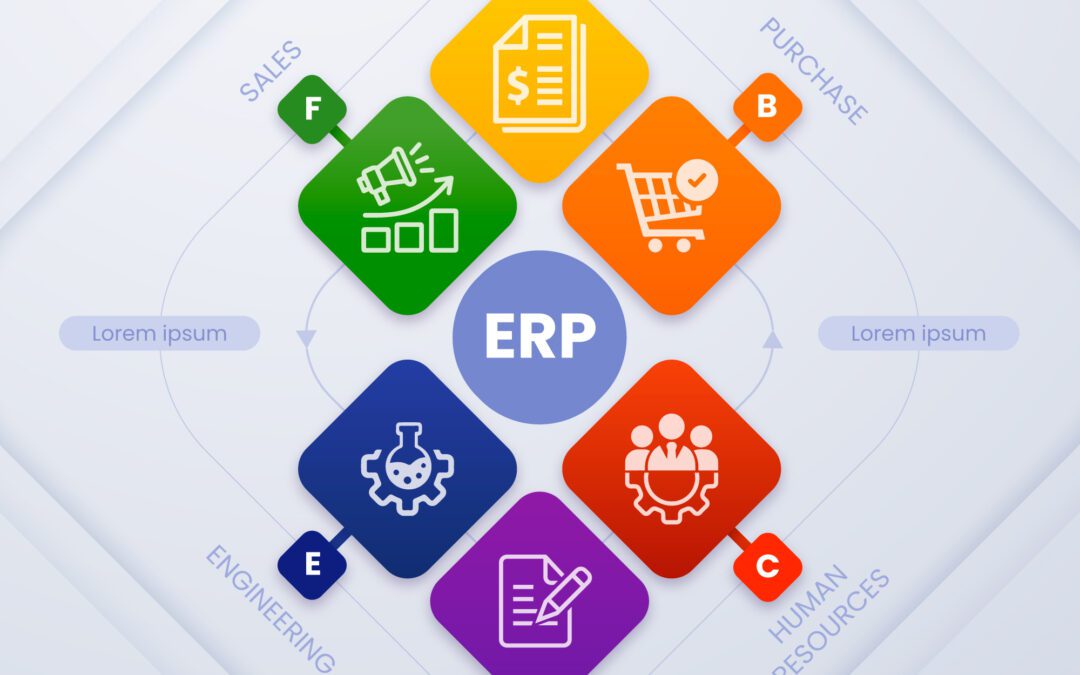In today’s fast-paced digital world, Enterprise Resource Planning (ERP) solutions are no longer a luxury—they’re a necessity. Whether you’re a startup scaling fast, a mid-sized company seeking operational harmony, or a large enterprise looking to streamline legacy systems, ERP software solutions provide the backbone for business efficiency, data integration, and strategic growth.
But what makes ERP such a game-changer?
In this in-depth guide, we’ll walk you through everything you need to know about ERP solutions: what they are, why they matter, and how they can transform your business operations. This isn’t just a technical upgrade—it’s a full-scale digital evolution for your enterprise.
What Is an ERP Solution?
An ERP (Enterprise Resource Planning) solution is a type of software that helps organizations manage core business processes through a centralized system. This includes areas like:
-
Finance and accounting
-
Inventory and supply chain
-
Human resources
-
Customer relationship management (CRM)
-
Sales and marketing
-
Procurement
-
Manufacturing and production
Instead of using disconnected software for each function, ERP integrates all business functions into one platform. This ensures data consistency, real-time reporting, and collaborative workflows across departments.
The Core Components of an ERP System
Modern ERP solutions come packed with features, but they typically include the following core modules:
-
Financial Management: General ledger, accounts payable/receivable, budgeting, forecasting.
-
Human Resources Management: Payroll, time tracking, performance management, recruitment.
-
Supply Chain Management: Procurement, inventory, logistics, demand forecasting.
-
Customer Relationship Management (CRM): Lead tracking, customer interactions, service management.
-
Manufacturing & Operations: Production planning, scheduling, quality control.
-
Business Intelligence & Analytics: Real-time dashboards, predictive analytics, reporting tools.
Each module shares a central database, enabling seamless communication between departments.
Why ERP Solutions Are Critical for Business Success
Let’s dig into the core reasons why ERP systems are not just important—but vital for businesses looking to thrive in a competitive landscape.
1. Centralized Data = Better Decisions
Imagine having your sales data in one software, your financials in another, and HR records on spreadsheets. This is a recipe for data silos, inefficiency, and miscommunication.
ERP solutions eliminate this by consolidating data into one platform. The result? Informed decision-making, real-time insights, and a single source of truth for all stakeholders.
2. Improved Productivity and Efficiency
Repetitive tasks like manual data entry, invoice processing, or report generation are time-consuming and prone to human error. ERP systems automate these processes using workflows, AI, and machine learning to enhance productivity.
According to a report by Panorama Consulting Solutions, organizations using ERP saw a 23% improvement in business process efficiency.
3. Cost Savings Over Time
While the initial ERP implementation can be costly, the long-term cost savings are significant. Businesses reduce expenses by:
-
Minimizing manual errors
-
Improving inventory control
-
Avoiding duplicate systems
-
Reducing IT support needs
ERP systems also offer scalability, helping businesses grow without proportionally increasing costs.
4. Enhanced Collaboration Across Teams
When departments operate in silos, collaboration becomes a challenge. ERP software fosters cross-functional collaboration by offering shared data access, transparent communication, and role-based access.
For example, the sales team can view inventory levels in real time, while finance can track purchase orders made by procurement—no more waiting for email updates or chasing spreadsheets.
5. Regulatory Compliance Made Easier
Most ERP systems include features to help companies remain compliant with industry regulations, such as:
-
GAAP and IFRS for financial reporting
-
HIPAA for healthcare data
-
GDPR for data protection
Automated audit trails, access controls, and documentation ensure you stay on top of compliance requirements.
6. Real-Time Reporting and Analytics
Say goodbye to outdated quarterly reports. With ERP systems, real-time dashboards and analytics tools allow business leaders to track KPIs, monitor trends, and make data-driven decisions on the fly.
Advanced ERP solutions even integrate with AI-powered analytics, giving predictive insights into customer behavior, market trends, and operational bottlenecks.
7. Mobility and Remote Access
Modern ERP solutions are cloud-based, offering mobile access and remote connectivity. This is a game-changer for hybrid and remote teams. With role-based access and encrypted data channels, employees can access critical systems securely from anywhere in the world.
Cloud ERP leaders like Oracle NetSuite, SAP Business ByDesign, and Microsoft Dynamics 365 are paving the way for mobile ERP integration.
8. Better Customer Experiences
A well-integrated ERP system gives your teams better visibility into customer data, enabling personalized service and faster issue resolution.
For example:
-
Sales can access order history
-
Customer service can see complaint logs
-
Marketing can target personalized campaigns
A customer-first ERP approach means higher satisfaction, better retention, and stronger loyalty.
9. Scalable as You Grow
ERP systems are highly scalable. Whether you’re adding new locations, launching new products, or expanding into international markets, ERP platforms adapt with multi-currency, multi-language, and multi-country capabilities.
This future-proofing ensures you’re not constantly migrating to new systems as your business grows.
10. Competitive Advantage
Finally, ERP systems help you outperform your competition by streamlining processes, reducing delays, and responding faster to market demands.
With a solid ERP in place, your business can:
-
Launch products quicker
-
Respond to customer issues faster
-
Make strategic pivots with data-backed confidence
Popular ERP Solutions for Businesses in 2025
Here’s a quick rundown of some of the most popular ERP systems available today:
| ERP Solution | Best For | Deployment | Website |
|---|---|---|---|
| SAP S/4HANA | Enterprises & Manufacturing | Cloud & On-Prem | Visit Site |
| Oracle NetSuite | Mid-sized to Large Businesses | Cloud | Visit Site |
| Microsoft Dynamics 365 | Versatile Business Needs | Cloud | Visit Site |
| Odoo | SMEs & Customization | Cloud & On-Prem | Visit Site |
| Infor ERP | Manufacturing & Healthcare | Cloud | Visit Site |
Each ERP platform has its own strengths, so it’s important to match the tool with your industry, growth goals, and technical needs.
How to Choose the Right ERP for Your Business
When selecting an ERP solution, consider the following:
-
Business Size and Industry
-
Cloud vs. On-Premises
-
Budget and ROI Expectations
-
Customization Needs
-
Integration with Existing Tools
-
Vendor Support & Community
-
User Experience & Training
Conducting a thorough needs analysis before choosing a vendor will help you get the most value from your investment.
ERP Implementation: Challenges to Watch Out For
ERP implementations can be tricky if not handled correctly. Watch out for these common challenges:
-
Underestimating Time & Resources
-
Inadequate Training
-
Poor Data Migration
-
Resistance to Change
-
Over-customization
To overcome these, work with experienced ERP consultants, invest in proper training, and involve stakeholders early in the process.
Benefits of Cloud-Based ERP vs. On-Premises ERP
| Feature | Cloud ERP | On-Premises ERP |
|---|---|---|
| Cost | Subscription-based (OpEx) | One-time license (CapEx) |
| Updates | Automatic | Manual |
| Accessibility | Remote & Mobile Access | Local Only |
| Maintenance | Handled by Vendor | In-House IT Required |
| Scalability | High | Moderate |
Cloud ERP is ideal for modern businesses seeking flexibility, lower upfront costs, and remote access.
Case Study: ERP Success Story
Company: A mid-sized manufacturing company in Texas
Challenge: Disconnected systems causing delays in inventory and order processing
Solution: Implemented SAP Business One ERP
Results:
-
Reduced order processing time by 40%
-
Achieved 100% inventory accuracy
-
Improved customer satisfaction scores by 30%
This illustrates how the right ERP solution can drive real operational gains.
Conclusion: ERP Is the Backbone of Modern Business
ERP solutions are no longer optional—they’re essential. They provide the infrastructure, data intelligence, and automation needed to compete in a digital-first economy.
From streamlining operations and improving decision-making to enhancing customer experiences and driving growth, ERP is a catalyst for transformation.
Ready to implement ERP for your business? Begin with a comprehensive needs assessment, involve key departments, and select a solution that fits your long-term goals.
✅ Pro Tip: Use platforms like G2 or Capterra to compare ERP software based on real user reviews.
If you found this article helpful, don’t forget to bookmark, share, or leave a comment below with your thoughts!
Need help with ERP implementation or vendor selection? Contact us today for a free consultation.




